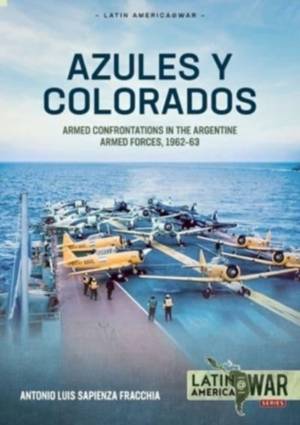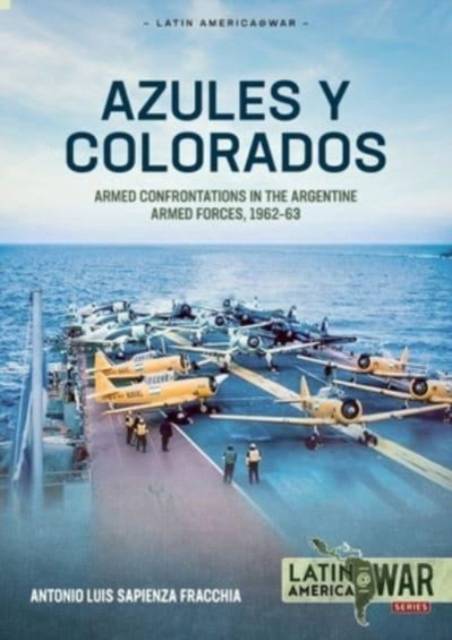
Bedankt voor het vertrouwen het afgelopen jaar! Om jou te bedanken bieden we GRATIS verzending (in België) aan op alles gedurende de hele maand januari.
- Afhalen na 1 uur in een winkel met voorraad
- In januari gratis thuislevering in België
- Ruim aanbod met 7 miljoen producten
Bedankt voor het vertrouwen het afgelopen jaar! Om jou te bedanken bieden we GRATIS verzending (in België) aan op alles gedurende de hele maand januari.
- Afhalen na 1 uur in een winkel met voorraad
- In januari gratis thuislevering in België
- Ruim aanbod met 7 miljoen producten
Zoeken
Azules Y Colorados
Armed Confrontations in the Argentine Armed Forces, 1962-63
Antonio Luis Sapienza Fracchia
€ 27,95
+ 55 punten
Omschrijving
Richly illustrated with authentic photography and custom-drawn color profiles and maps, this book is an indispensable source of reference about one of the crucial moments in Argentine history.
'Azules y Colorados' is the name originally used to designate two parties in hypothetical scenarios during an exercise. In 1962-1963, it provided the name for a series of armed confrontations between two branches of the Argentine Armed Forces. Both took place during the de facto presidency of José María Guido and aimed to settle the struggle between the top ranks of the Argentine military, and determine its future position in the state and society.
All branches of the Argentine armed forces shared the country's alignment with the United States of America in the Cold War and the need to combat communism, but they were in disagreement regarding the attitude vis-à-vis the ideology of Peronism and the professional profile of the Armed Forces. The Azules proposed a limited integration of Peronism into Argentine political life and armed forces with a high degree of autonomy, though unified through a strict chain of command. The Colorados equated Peronism with Communism, advocating the complete eradication of both, and were characterized by a greater politicization of the military and deliberative inner workings. By 1962, each wing was fighting to gain control over the entire Armed Forces and thus be in a position to exercise guardianship over the government and set the course that national policy should follow. Politically, the radicals of the people (Balbinistas) were closer to the Colorados, while the intransigent radicals (Frondisistas) were closer to the Azules.
The confrontation between the two groups was expressed in several episodes and two armed clashes, the first that took place between 16 and 18 September 1962, and the second between 2 and 5 April 2 1963. The military files registered the death of 24 combatants on both sides, while 87 were wounded, all of them in the second confrontation. Eyewitnesses reported the existence of several additional dead and wounded in both confrontations, most of them civilians, but this was never officially confirmed - however, the participation of civilians on the Colorados side was substantiated and remains well-known. Eventually, the clashes in April 1963 resulted in the Azules - led by General Juan Carlos Ongania - establishing themselves in a position of dominance over all the branches of the armed forces, supported by both civilian and ecclesiastical sectors of the society, the so-called 'Military Party'.
Azules y Colorados is the first military history of that conflict, richly illustrated with authentic photography and custom-drawn color profiles and maps, it is an indispensable source of reference about one of the crucial moments in Argentine's history.
'Azules y Colorados' is the name originally used to designate two parties in hypothetical scenarios during an exercise. In 1962-1963, it provided the name for a series of armed confrontations between two branches of the Argentine Armed Forces. Both took place during the de facto presidency of José María Guido and aimed to settle the struggle between the top ranks of the Argentine military, and determine its future position in the state and society.
All branches of the Argentine armed forces shared the country's alignment with the United States of America in the Cold War and the need to combat communism, but they were in disagreement regarding the attitude vis-à-vis the ideology of Peronism and the professional profile of the Armed Forces. The Azules proposed a limited integration of Peronism into Argentine political life and armed forces with a high degree of autonomy, though unified through a strict chain of command. The Colorados equated Peronism with Communism, advocating the complete eradication of both, and were characterized by a greater politicization of the military and deliberative inner workings. By 1962, each wing was fighting to gain control over the entire Armed Forces and thus be in a position to exercise guardianship over the government and set the course that national policy should follow. Politically, the radicals of the people (Balbinistas) were closer to the Colorados, while the intransigent radicals (Frondisistas) were closer to the Azules.
The confrontation between the two groups was expressed in several episodes and two armed clashes, the first that took place between 16 and 18 September 1962, and the second between 2 and 5 April 2 1963. The military files registered the death of 24 combatants on both sides, while 87 were wounded, all of them in the second confrontation. Eyewitnesses reported the existence of several additional dead and wounded in both confrontations, most of them civilians, but this was never officially confirmed - however, the participation of civilians on the Colorados side was substantiated and remains well-known. Eventually, the clashes in April 1963 resulted in the Azules - led by General Juan Carlos Ongania - establishing themselves in a position of dominance over all the branches of the armed forces, supported by both civilian and ecclesiastical sectors of the society, the so-called 'Military Party'.
Azules y Colorados is the first military history of that conflict, richly illustrated with authentic photography and custom-drawn color profiles and maps, it is an indispensable source of reference about one of the crucial moments in Argentine's history.
Specificaties
Betrokkenen
- Auteur(s):
- Uitgeverij:
Inhoud
- Aantal bladzijden:
- 104
- Taal:
- Engels
- Reeks:
Eigenschappen
- Productcode (EAN):
- 9781804512197
- Verschijningsdatum:
- 25/09/2023
- Uitvoering:
- Paperback
- Formaat:
- Trade paperback (VS)
- Afmetingen:
- 208 mm x 295 mm
- Gewicht:
- 498 g

Alleen bij Standaard Boekhandel
+ 55 punten op je klantenkaart van Standaard Boekhandel
Beoordelingen
We publiceren alleen reviews die voldoen aan de voorwaarden voor reviews. Bekijk onze voorwaarden voor reviews.









